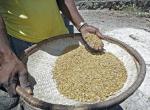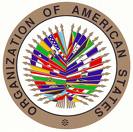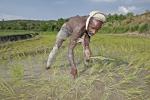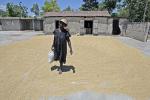Haiti Food Security Update (4/27/2008)
 Security and food security go hand in hand in countries like Haiti that are dependent on importation for survival. President Rene Preval announced a 15 percent cut in rice prices and a series of measures to uphold national food production namely by providing subsidies, credit and technical assistance to farmers. Rice exports are banned. However, Haitians cannot survive on rice alone. Corn, beans, oil, etc. all remain expensive. The President has yet to appoint a Prime Minister who can assemble a new Cabinet. We hope, whoever he or she is, the new Prime Minister will take food security seriously and communicate often with the public about what is doing to reduce food costs and improve national production. This should have been a priority long ago.
Security and food security go hand in hand in countries like Haiti that are dependent on importation for survival. President Rene Preval announced a 15 percent cut in rice prices and a series of measures to uphold national food production namely by providing subsidies, credit and technical assistance to farmers. Rice exports are banned. However, Haitians cannot survive on rice alone. Corn, beans, oil, etc. all remain expensive. The President has yet to appoint a Prime Minister who can assemble a new Cabinet. We hope, whoever he or she is, the new Prime Minister will take food security seriously and communicate often with the public about what is doing to reduce food costs and improve national production. This should have been a priority long ago.
 When the G8 meets in July for a heads of state summit, they will discuss the social, economic, and political consequences of food prices for the first time in 30 years. The fact that the G8 is addressing this issue at such a high level indicates the seriousness of global food insecurity.
When the G8 meets in July for a heads of state summit, they will discuss the social, economic, and political consequences of food prices for the first time in 30 years. The fact that the G8 is addressing this issue at such a high level indicates the seriousness of global food insecurity.
 The International Monetary Fund also gave a warning that the impact of the rising costs of food and food commodities “risk becoming a destabilising force in the global economy”. Risk? Clearly, it is already happening.
The International Monetary Fund also gave a warning that the impact of the rising costs of food and food commodities “risk becoming a destabilising force in the global economy”. Risk? Clearly, it is already happening.
 The World Bank, under the leadership of Robert Zoellick, has emerged as an advocate for food security. In a speech earlier this month, Zoellick made a commitment to "retool the organization and provide programs that focus on sustainability rather than temporary solutions." His concern is that the food insecurity could result in “seven lost years” in the fight against poverty. He went on to note. "If the humanitarian crisis is not solved, disruptions may occur in the economic environment...so that at the end of the day most governments, having done well during the last five or 10 years, will see what they have done totally destroyed, and their legitimacy facing the population destroyed also."
The World Bank, under the leadership of Robert Zoellick, has emerged as an advocate for food security. In a speech earlier this month, Zoellick made a commitment to "retool the organization and provide programs that focus on sustainability rather than temporary solutions." His concern is that the food insecurity could result in “seven lost years” in the fight against poverty. He went on to note. "If the humanitarian crisis is not solved, disruptions may occur in the economic environment...so that at the end of the day most governments, having done well during the last five or 10 years, will see what they have done totally destroyed, and their legitimacy facing the population destroyed also."
![]()
 The secretary-general of the Organization of American States (OAS) is keenly interested in helping Haiti to expand its agricultural base. He stated that he hopes rising world food prices present an opportunity for Haiti to increase crop production for local consumption and foreign markets. OAS has offered several proposals. We hope these proposals will focus first and foremost on the staples Haitans need for survival.
The secretary-general of the Organization of American States (OAS) is keenly interested in helping Haiti to expand its agricultural base. He stated that he hopes rising world food prices present an opportunity for Haiti to increase crop production for local consumption and foreign markets. OAS has offered several proposals. We hope these proposals will focus first and foremost on the staples Haitans need for survival.
 There has been some coverage this week of the lack of large scale farming in Haiti. There are historical reasons for this. The way the French treated slaves was appalling. They were literally worked to death because it was more cost effective than providing health care. When Haitians won their freedon, they destroyed everything associated with the French and especially the plantations where they were made to suffer each day expendable, without rights, without hope. There was a great scattering and Haitians went far and wide to find land to call their own. Above all else, they wanted to be free, independent, and to produce for their own needs. Getting by has become harder and harder. With so many small farmers, one solution may be to move back toward collective farming. It was once much more common than today. Take a look at this photo gallery of farming practices in Haiti coutesy of the Miami Herald
There has been some coverage this week of the lack of large scale farming in Haiti. There are historical reasons for this. The way the French treated slaves was appalling. They were literally worked to death because it was more cost effective than providing health care. When Haitians won their freedon, they destroyed everything associated with the French and especially the plantations where they were made to suffer each day expendable, without rights, without hope. There was a great scattering and Haitians went far and wide to find land to call their own. Above all else, they wanted to be free, independent, and to produce for their own needs. Getting by has become harder and harder. With so many small farmers, one solution may be to move back toward collective farming. It was once much more common than today. Take a look at this photo gallery of farming practices in Haiti coutesy of the Miami Herald
 The World Food Programme (WFP) continues to advocate for the resources need to feed 1.7 million of the most vulnerable Haitians. The agency held a food distribution in Cite Soleil but had to turn many away as they only had enough food for 1,000 people. The agency is concerned the number of people needing food assistance could rise as high as 5 million - more than half of the population! WFP is working with the Haitian government aned other partners to pull togther budget figures to present to donors. According to WFP, 22 percent of Haitian children are underweight because of malnutrition and 9 percent of them suffer acute malnutrition, while 50 percent of pregnant Haitian women are anemic. Children, pregnant women, and nurisng mothers will be given priority. Clck here to read about the head of WFP's call to action. If you want more background on why there is a global food crisis in the first place, take a look at a this article in Time. The head of WFP has noted that while we are indeed in an emergency right now, she is optimistic over the medium to long term because the world knows how to produce enough food. First we have to get out of our current situation, though.
The World Food Programme (WFP) continues to advocate for the resources need to feed 1.7 million of the most vulnerable Haitians. The agency held a food distribution in Cite Soleil but had to turn many away as they only had enough food for 1,000 people. The agency is concerned the number of people needing food assistance could rise as high as 5 million - more than half of the population! WFP is working with the Haitian government aned other partners to pull togther budget figures to present to donors. According to WFP, 22 percent of Haitian children are underweight because of malnutrition and 9 percent of them suffer acute malnutrition, while 50 percent of pregnant Haitian women are anemic. Children, pregnant women, and nurisng mothers will be given priority. Clck here to read about the head of WFP's call to action. If you want more background on why there is a global food crisis in the first place, take a look at a this article in Time. The head of WFP has noted that while we are indeed in an emergency right now, she is optimistic over the medium to long term because the world knows how to produce enough food. First we have to get out of our current situation, though.

The International Organization for Migration (IOM) is looking to expand its infrastructure program to provide more labor and income generation opportunities while making long-term investments in infrastructure and agricultural projects. So far, IOM programs have increased economic opportunities in volatile and poor neighborhoods in Haiti ’s six major urban centers. Over the past two years, more than 38,000 short-term jobs have been created through these programs, a critical source of income for residents in poor communities. If you need more information on these programs, contact Matthew van Geest, IOM Haiti , Tel +509 38487675, email mvangeest@iom.int or Frislain Isidor, Tel: +509 36056004, email: fisidor@iom.int.
 The United Nations Children's Fund (UNICEF) released a statement of concern about rising food prices. The UN has argued that farm aid and fair trade are the best route of this crisis. We agree. Agriculture has never been a level playing field. The UN states between 2003 and 2005, $1.3 billion of development aid was spent on governance initiatives in the world's poorest countries, compared with just $12 million on agricultural development. Many a government will be shaken or ousted if their citizens cannot feed themselves.
The United Nations Children's Fund (UNICEF) released a statement of concern about rising food prices. The UN has argued that farm aid and fair trade are the best route of this crisis. We agree. Agriculture has never been a level playing field. The UN states between 2003 and 2005, $1.3 billion of development aid was spent on governance initiatives in the world's poorest countries, compared with just $12 million on agricultural development. Many a government will be shaken or ousted if their citizens cannot feed themselves.  According to the President of Ghana John Kufuor, "Ghana and other African countries are subject to the vagaries of global markets, which leave them with no control over the prices of their own commodities," he said, giving China and India as examples of developing countries that had learned how to benefit from trade and globalisation. Haiti is in a similar situation as many African countries. Farm aid without fair trade will hinder progress. If the developed world truly intends to help the developing world feed themselves, develop their economies, and be competitive, we know what was has to be done.
According to the President of Ghana John Kufuor, "Ghana and other African countries are subject to the vagaries of global markets, which leave them with no control over the prices of their own commodities," he said, giving China and India as examples of developing countries that had learned how to benefit from trade and globalisation. Haiti is in a similar situation as many African countries. Farm aid without fair trade will hinder progress. If the developed world truly intends to help the developing world feed themselves, develop their economies, and be competitive, we know what was has to be done.
 This is where things stand now. The Haitian government is belatedly taking measures to reduce the cost of rice and is trying to get its house in order when it comes to natural production. The price tag of doing so will be high as the sector has been neglected for decades and the environmental degradation has only gotten worse. Both can be addressed at the same time. The international community is showing a willingness to help this struggling democracy. The support of the donors, partner governments and the Haitian Diaspora are needed - but we all have a role to play and can help make the situation better.
This is where things stand now. The Haitian government is belatedly taking measures to reduce the cost of rice and is trying to get its house in order when it comes to natural production. The price tag of doing so will be high as the sector has been neglected for decades and the environmental degradation has only gotten worse. Both can be addressed at the same time. The international community is showing a willingness to help this struggling democracy. The support of the donors, partner governments and the Haitian Diaspora are needed - but we all have a role to play and can help make the situation better.
There has been a great deal of coverage this week on food insecurity in Haiti. If I have missed anything, please feel free to post it in the comments section.
Bryan
Add new comment